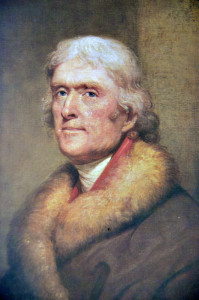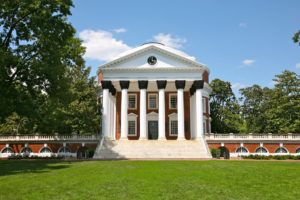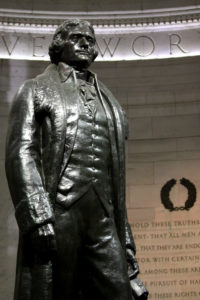Posted by Roberta Grimes • September 19, 2020 • 52 Comments
Jesus, Thomas Jefferson
“Millions of innocent men, women, and children,
since the introduction of Christianity,
have been burnt, tortured, fined, imprisoned;
yet we have not advanced one inch toward uniformity.
What has been the effect of coercion?
To make one half of the world fools and the other half hypocrites.”
– Thomas Jefferson (1743-1826), from Notes on the State of Virginia (1787)
 Thomas Jefferson was the first Secretary of State, the second Vice President, and the third President of the United States. He was the primary author of the Declaration of Independence, and he made it a document of such emotional power and intellectual weight that it has become the moral conscience of the most powerful nation on earth. You or I would be proud to have lived such a life! But the being who was Thomas Jefferson was instead deeply disappointed by it. When he spoke through Leslie Flint in 1960, he refused to talk about that lifetime. When he spoke to me through a medium in 2015, he said, “I had too much power and I didn’t always use it well.” He was castigated for his religious views and even called an atheist, but in fact he was nothing of the sort. He was instead a deeply spiritual man simply thinking two centuries ahead of his time.
Thomas Jefferson was the first Secretary of State, the second Vice President, and the third President of the United States. He was the primary author of the Declaration of Independence, and he made it a document of such emotional power and intellectual weight that it has become the moral conscience of the most powerful nation on earth. You or I would be proud to have lived such a life! But the being who was Thomas Jefferson was instead deeply disappointed by it. When he spoke through Leslie Flint in 1960, he refused to talk about that lifetime. When he spoke to me through a medium in 2015, he said, “I had too much power and I didn’t always use it well.” He was castigated for his religious views and even called an atheist, but in fact he was nothing of the sort. He was instead a deeply spiritual man simply thinking two centuries ahead of his time.
Jefferson was fluent in English, French, Greek, and Latin. As he sought to better understand the teachings of Jesus, he cut up Bibles and pasted the Lord’s Gospel words into a copybook in all four languages. Of his compilation of what was later called The Jefferson Bible, he said, “My aim was to justify the character of Jesus against the fictions of his pseudo-followers… the follies, the falsehoods and the charlatanisms which his biographers father upon him.” – letter to William Short, August 4, 1820
 In freshly reviewing Jefferson’s writings, I am struck by how closely his work with us here aligns with what he thought during that lifetime. The only differences come from the added insights that he gained once he died and learned that, happily, both God and a wonderful afterlife are real. Almost twenty thousand of his letters survive, and they contain far too many quotations that could be usefully included here; but I will give you a flavor of his ideas in six areas:
In freshly reviewing Jefferson’s writings, I am struck by how closely his work with us here aligns with what he thought during that lifetime. The only differences come from the added insights that he gained once he died and learned that, happily, both God and a wonderful afterlife are real. Almost twenty thousand of his letters survive, and they contain far too many quotations that could be usefully included here; but I will give you a flavor of his ideas in six areas:
WE CANNOT BE SURE ABOUT GOD OR AN AFTERLIFE
“I believe in both a creative and personal God, a divinely ordered universe, that man has a innate moral sense, and that Jesus was a great moral teacher, perhaps the greatest the world has witnessed.” – letter to his nephew, Peter Carr, August 10, 1787
“To talk of immaterial existences is to talk of nothings. To say that the human soul, angels, god, are immaterial, is to say they are nothings, or that there is no god, no angels, no soul. I cannot reason otherwise … without plunging into the fathomless abyss of dreams and phantasms. I am satisfied, and sufficiently occupied with the things which are, without tormenting or troubling myself about those which may indeed be, but of which I have no evidence.” – letter to John Adams, August 15, 1820
GOD IS NOT A TRINITY
 “It is too late in the day for men of sincerity to pretend they believe in the Platonic mysticisms that three are one, and one is three; and yet that the one is not three, and the three are not one…. But this constitutes the craft, the power and the profit of the priests. Sweep away their gossamer fabrics of factitious religion, and they would catch no more flies.” – letter to John Adams, August 22, 1813
“It is too late in the day for men of sincerity to pretend they believe in the Platonic mysticisms that three are one, and one is three; and yet that the one is not three, and the three are not one…. But this constitutes the craft, the power and the profit of the priests. Sweep away their gossamer fabrics of factitious religion, and they would catch no more flies.” – letter to John Adams, August 22, 1813
“The hocus-pocus phantasm of a god like another Cerberus, with one body and three heads, had its birth and growth in the blood of thousands and thousands of martyrs.” – letter to James Smith, December 8, 1822
“I trust there is not a young man now living in the United States who will not die a Unitarian.” – letter to Benjamin Waterhouse, June 26, 1822
JESUS WAS HUMAN AND NOT DIVINE
 “To the corruptions of Christianity I am indeed opposed; but not to the genuine precepts of Jesus himself. I am a Christian, in the only sense he wished any one to be; sincerely attached to his doctrines, in preference to all others; ascribing to himself every human excellence; & believing he never claimed any other.” – letter to Benjamin Rush, April 21, 1803
“To the corruptions of Christianity I am indeed opposed; but not to the genuine precepts of Jesus himself. I am a Christian, in the only sense he wished any one to be; sincerely attached to his doctrines, in preference to all others; ascribing to himself every human excellence; & believing he never claimed any other.” – letter to Benjamin Rush, April 21, 1803
“That Jesus did not mean to impose himself on mankind as the son of God, physically speaking, I have been convinced.” – letter to William Short, August 4, 1820
“The day will come when the mystical generation of Jesus, by the supreme being as his father in the womb of a virgin, will be classed with the fable of the generation of Minerva in the brain of Jupiter.” – letter to John Adams, April 11, 1823
FREEDOM OF THOUGHT IS ESSENTIAL
“No man shall be compelled to frequent or support any religious worship,  place, or ministry whatsoever. ” – Virginia Act for Religious Freedom, 1786
place, or ministry whatsoever. ” – Virginia Act for Religious Freedom, 1786
“Question with boldness even the existence of a God; because, if there be one, he must more approve of the homage of reason than that of blindfolded fear.” – letter to his nephew, Peter Carr, August 10, 1787
“I have sworn upon the altar of God eternal hostility against every form of tyranny over the mind of man.” – letter to Benjamin Rush, September 23, 1800
CHRISTIANITY IS HARMFUL AND COERCIVE
“The purest system of morals ever before preached to man (the teachings of Jesus) has been adulterated and sophisticated by artificial constructions into a mere contrivance to filch wealth and power.” – letter to Samuel Kercheval, January 19, 1810
 “Paul was the… first corrupter of the doctrines of Jesus. These palpable interpolations and falsifications of his doctrines led me to try to sift them apart.” – letter to William Short, April 13, 1820
“Paul was the… first corrupter of the doctrines of Jesus. These palpable interpolations and falsifications of his doctrines led me to try to sift them apart.” – letter to William Short, April 13, 1820
“The truth is, that the greatest enemies to the doctrines of Jesus are those, calling themselves the expositors of them, who have perverted them for the structure of a system of fancy absolutely incomprehensible, and without any foundation in his genuine words.” – letter to John Adams, April 11, 1823
THE TEACHINGS OF JESUS ARE OF GREAT MORAL WORTH
“Of all the systems of morality, ancient or modern which have come under my observation, none appears to me so pure as that of Jesus…. I am a real Christian, that is to say, a disciple of the doctrines of Jesus.” – letter to Charles Thomson, January 9, 1816
“The genuine and simple religion of Jesus will one day be restored: such as it was preached and practiced by Himself.” – letter to Francois Adriaan Van der Kemp, July 9, 1820
“The doctrines of Jesus are simple and tend all to the happiness of man, that  there is only one God and God is perfect. That God and man are one. That to love God with all your heart, and your neighbor as yourself, is the sum of religion. These are the great points on which I endeavor to reform and live my life.” – Letter to Benjamin Waterhouse, June 26, 1822
there is only one God and God is perfect. That God and man are one. That to love God with all your heart, and your neighbor as yourself, is the sum of religion. These are the great points on which I endeavor to reform and live my life.” – Letter to Benjamin Waterhouse, June 26, 1822
“Had the doctrines of Jesus been preached always as pure as they came from his lips, the whole civilized world would now have been Christians.” – Letter to Benjamin Waterhouse, June 26, 1822
Thomas Jefferson was a spiritual thinker at least two hundred years ahead of his time. Few who were his contemporaries could have grasped the notion that for Jefferson to love and closely follow Jesus while at the same time he despised Christianity was no inconsistency. Even now, to many that makes no sense! His views changed over the course of that lifetime. He went from merely loving the Lord’s Gospel words in his youth to the urgency about rescuing them from the shell of Christianity that is evident in  his later writings. It seems to me likely that his early interest in Jesus was developed in prior lifetimes; but when I tried to investigate the sixteen priors that he tells me he and I have shared, he refused to allow that. Too much information, apparently.
his later writings. It seems to me likely that his early interest in Jesus was developed in prior lifetimes; but when I tried to investigate the sixteen priors that he tells me he and I have shared, he refused to allow that. Too much information, apparently.
And we can follow his development even after his death! He was so disappointed in how he had handled power in what should have been his final lifetime that he took an additional lifetime as a simple farmer in Wales in order to get himself back into balance. Then, 134 years after he died as Jefferson, he spoke freshly to the twentieth century in his famous persona. You can see in that interview that he was becoming the beautiful being that he is today. Stay tuned….
“On the dogmas of religion, as distinguished from moral principles,
all mankind, from the beginning of the world to this day,
have been quarreling, fighting, burning and torturing one another,
for abstractions unintelligible to themselves and to all others,
and absolutely beyond the comprehension of the human mind.”
– Thomas Jefferson (1743-1826), letter to Archibald Cary (1816)
Dear Roberta, I am psyched about this! A question was answered already; about virgin birth. Thanks for all you and Thomas are doing.
Dear Ray, I’m delighted about it too! I’m surprised that Thomas, who has been so reticent for so long, is now unexpectedly interested in sharing so much of himself here; but this is the first of three posts, and I’m excited about the next two as well!
Dearest Roberta, these quotes of Thomas Jefferson are really inspiring. My favorite is the one where he sums up the essence of the truth he finds:
– The doctrines of Jesus are simple. They direct everyone to the happiness of mankind.
-There is only one God who is perfect.
-Man and God are one.
– To Love God with all your heart and to love your neighbour as yourself is the sum of all religion.
This seems to me to be the essence of everything, once you strip away all the religious palaver… Thomas Jefferson had the gift of discernment even then, didn’t he? It seems even nowadays to be a rare gift that few have; the ability to discern the diamond of essential truth from the heap of rubble in which it resides.
I’ve heard it said that true intelligence is to pinpoint the significance of something. (Mostly we humans are baffled by the complications and sophistications of our world.) Certainly TJ has found the diamond long ago that we are only now coming to see.
I wonder how one develops such powerful discernment. Is it a clear, honest heart and the earnest seeking of God? 🙏🏼❣️👁
Dear Efrem, I have come to think that he and I shared many prior lifetimes together working at this project, so his Jefferson lifetime was not his first stab at it and neither has this lifetime been mine. He tells me we have shared 17 lifetimes as incarnated beings together (I was always a man), and I know that I was a young man in his Jefferson lifetime when he was old, and he and I worked on his Gospels project together. I think I may have been Richard Rush, the son of Jefferson’s great friend, Dr. Benjamin Rush: I even have an odd memory of talking with him in his cabinet. He has teased me, too, about another lifetime much farther back when he had been a rebel in France who sought shelter in a monastery from which he then wrote, and I was the monk assigned to edit his work to make sure it wasn’t too radical. He found it funny that now he is the one editing my work!
Dearest Roberta, this is absolutely fascinating. What an amazing soul relationship you and T J have that weaves through lifetimes. It is certainly a deep connection that is beyond any one time and place!
I’m finding that working with my Guide in Spirit is opening up unforeseen, felicitous possibilities.
This is really the way to go for me; my help is always there behind the scenes. I wish more people knew that all they need to do to maximize this assistance is ask… 🙂
Dear Efrem, this relationship with one’s spirit guide really is an amazing one! It seems that often a lifetime together is just a moment in a long history that we have no memory off. In our case, I can’t wait to find out the rest of the stories! Thomas really isn’t his Jefferson lifetime to me anymore, although I admit to having been starstruck when I first learned who he had been. I want to know more, right now, about those other lifetimes, but he won’t allow it. He tells me that each of us has led lifetimes that were more important in the view of the Councils than his Jefferson excursion, which I cannot imagine.
And I have learned so much that I can now teach! For one small example, the fact that essential personalities and relationships seem to stay consistent through many lifetimes. He has always been dominant, apparently, and I have always been his sidekick, factotum, assistant, enabler, or – as now – his avatar. We work together well this way, and in each new pairing of personas we immediately slip into essentially the same relationship. I find that fact fascinating!
Hi Roberta and Efrem,
I too am discovering a relationship with my wise and beloved guide that prior to this point in this experience we perceive as incarnation I had never considered. The teaming up with one “at home” and one “away” is so strategically thought out it seems safe to say “we” are both—Arrow and I—having this as a collective experience. I think it could make a great blog topic but, Roberta, I know he has you booked for a few weeks in advance!
Why didn’t Jesus leave any writings of his own. What was he exactly expecting would happen just by coming here and live an exemplary life. And why come then and not again now or in between. Why the mystery, the absence of direct communication with us. Why does it have to be only guides (souls) who contact some of us. I don’t believe we can’t grow in paradise just as well as in the physical world. Seems to me we would all take on the most challenging life on earth to grow as much possible. What do you learn from being a sadistic serial killer or a simple corner drug pusher waisting his life away with drugs, alcohol and promiscuous sex ???
Dear Francois, please understand that the Godhead is vastly greater and infinitely more powerful than what you seem to be envisioning from what you say here. The Godhead is all. It holds not just the high cards, but all the cards! And these little lives of ours are just brief and trivial illusions. To answer your questions:
1) Jesus came into a body briefly from the highest aspect of the Godhead to give us a series of messages, but He is of the Godhead. He didn’t come from nowhere, and He didn’t go back to nowhere: in fact, He always has been here and He never left.
2) The words that He gave us went through three generations of oral transmission, two translations, and then 1500 years in the custody of Christians, and still we are told by the dead that when we pluck out Nicaea’s nonsense the teachings are correct. So they have been in continuous divinely-inspired custody, and they remain so today!
3) Your guide is your direct contact with the Godhead.
4) You can’t grow in paradise, as you call it, because you are still steeped in negativity. You (and I, and all of us) have to first get our personal energies into the positive range. Otherwise, the gap between our energies and what we encounter after death is so great that we have no idea even how we might overcome that gap.
5) No one ever plans a lifetime like the awful ones you suggest! But we must have free will in order to grow at all, and that means that a few will make negative choices. We all live many lifetimes – some estimate that for many of us it has been a hundred or more! – and eventually, we begin to make the right choices.
Please understand that the Christian God is yet another in the series of gods that people have made in their own image. The genuine Godhead is infinite, both in power and in perfect love. And you are always safe in those everlasting arms.
Dear Roberta and Thomas,
My heart and soul are filled with a sigh of hope and gratitude. I have always felt a sense of oppression in religion, despite being a good follower early in life. I had such a believing attitude that I could simply talk to God and Jesus and others in the opposite side of the veil, early in life. But, parental and church discipline squashed that. I have tears in my eyes and heart reading your letter today. Thank you again for your courage and perseverance. ❤️Fran
Oh dear Fran, thank you for saying this! The work that Thomas and I are doing together is my absolute, perfect joy, and what makes my heart swell is hearing from you that I have been of help to you. Thank you so much!
Very nice. It seems to me that Paul was not the first one to subvert Jesus’ teachings. His disciples were. Jesus commanded his 11 disciples to ‘teach… all the things I have commanded you..’, but if you read Acts. you can see that from the beginning they taught 0, yes zero of his words. They taught his resurrection and nothing else. All the disciples recorded in Acts made up their own gospel. Paul seemed to follow this when he said, ‘If thou wilt confess…. and believe in thine heart that God has raised him from the dead, thou shalt be saved.’
Yes, dear Marcia, this is an interesting point! The problem seems to be that those words were remembered and passed down for more than 200 years, so His disciples would indeed have taught them; and in fact, during all that time there was not a single cross depicted, even in the Roman Catacombs. This notion that Jesus died for our sins was just one of many ideas that the earliest followers of Jesus accommodated. But it was the best bet for building a religion, so once the Romans stopped killing Christians and started seeing them as useful, it was the theory they chose as the best one from which to build a useful fear-based religion. The Book of Acts was written at that point, and it was written around that revisionist history.
Who did he become 135 years later?
Thank you for sharing with me!
Dear Patty, I puzzled about this question, but now I get it. He chose to speak through Leslie Flint in 1960 as his famous persona, because at the time the team around Mr. Flint was concentrating on bringing forth famous dead folks. They wanted to hear from a dead Founding Father, and not so much from a dead guy named John Something whose final lifetime had been lived in Wales.
The quality of the Jefferson recording is poor, but the voice is unmistakably Jefferson’s! Since I actually knew him in his old age, I can tell you that the voice is his without question: when I first heard it, I had chills and I was at once back in his cabinet (private office) on a sunlit morning, listening as the old man spoke to me and then reached for his cup of tea. It was amazing!
But the being who spoke through Leslie Flint was already long past his Jefferson lifetime. He refused to talk about it at all, and instead he wanted to talk about world peace. And a few other things. You’ll get a flavor of it next week.
Hi Roberta, hi everybody! For what it’s worth, I have heard portions of that recording. It is indeed astonishing when you pause to consider what and who you are actually listening to. I also recall thinking, why don’t you talk some more about the founding of the U.S., but it’s true, his interest was much larger and the scope of his concerns much broader and aimed not at the 18th century, but the 20th. Astonishing stuff.
Dear Mike, it’s even more amazing when you realize that he had to remember more than a century later how his voice had sounded; and then modify the ectoplasm voice box to produce that voice recognizably, having to make allowance for the fact that there was no breath to propel the sound and there were no lips to shape it. And then – right from the start! – he had to dredge up words that he hadn’t used in more than a century and create an experience for the listener that would seem true to life. A lot of beings can’t do it. But he did it to such an extraordinary degree that his voice was instantly recognizable. Amazing! He didn’t enjoy the experience, though. It’s little wonder that he didn’t do it again!!
Dearest Roberta,
Years ago when I was an undergrad at Northeastern University, I took a most remarkable course on Constitutional Law taught by Prof. Robert L. Cord. Years later he was also the author of a book titled “Separation of Church and State: Historical Fact and Current Fiction” I was so impressed by Prof. Cord, I bought it and unfortunately, I have since lost it. But, from a book review published by Galaxie:
“Cord’s contention, making this the book’s only essential claim, is that the first amendment has been historically misinterpreted by the nation’s courts and its legal scholars. Further, the legal application derived from such misinterpretations runs counter to the original intent of the Constitution’s framers, especially James Madison and Thomas Jefferson. Cord’s argument rests upon what he sees as the historic misunderstanding of the “establishment” clause. He argues that neither Madison nor Jefferson intended to build a wall of absolute separation between the state and religion. Cord believes the complete secularization of the state was never the framer’s intention.”
Do you see confirmation of this in Jefferson’s own works?
Yours,
Cookie
Dear Cookie, this is such a great point!! When Jefferson was young, the colonists’ long cultural history even back to the British Isles was of a state-sponsored church (Anglican, in the case of Virginia), and everyone was supposed to go to that church. As you can see from the quote above from the Virginia Act for Religious Freedom that Jefferson wrote and got through the legislature in 1786, it was the notion of a state church that they all were fighting! They wanted to stop forcing people to support a state church, but all the Founders agreed that everyone needed the guidance of a Christian denomination of their own choice. The more extreme of the modern interpretations of the First Amendment are quite literally garbage put forth by those who want to destroy this nation as it was founded. Nothing less.
“The doctrines of Jesus are simple and tend all to the happiness of man, that there is only one God and God is perfect. That God and man are one. That to love God with all your heart, and your neighbor as yourself, is the sum of religion. These are the great points on which I endeavor to reform and live my life.” – Letter to Benjamin Waterhouse, June 26, 1822
Hi Roberta, hi everybody! To echo what Efrem notes in his comment above, Jefferson’s associating Jesus’ teachings with happiness jumped out at me when I read this quote. I think I remember learning (way back in high school) that the original wording in his Declaration preamble was going to be pursuit of property and he insisted on it being “happiness.” Indeed, it is fascinating that Jefferson connected the fundamental teaching of Christ to, of all things, in the 18th century Christian milieu— when getting to heaven seemed like a competition of the doleful—happiness!
Dear Mike, the traditional formulation back to long before this nation’s founding was that we had a basic right to life, liberty, and property. It was Jefferson who removed property and added instead “the pursuit of happiness.” And I can tell you why that change was so important to him.
Thomas Jefferson was in his youth an ardent abolitionist. He would never have said we have a right to “property,” since that would have strengthened the institution of slavery. And replacing that word with “the pursuit of happiness” further weakened slavery, since if that pursuit is a basic human right then slaves are entitled to it too. This change put the United States a little bit closer to the abolition that he ardently wanted but never saw in his lifetime.
I find the parrellisms of what Roberta has said in her books and podcasts are simple remarkable to what Thomas has said in his quotes. I do find for myself that some of the older English that Thomas uses, along with some of his vocabulary words are difficult for me to understand and I had to look them up and had to reread portions of what he was saying (this is not a bad thing just an observation). But one of the most interesting things talked about was Roberta’s memories of her past lives with Thomas. This fascinates me that here is more proof of the connection between Roberta and him!
Dear David, seeing how closely his work with me aligns with what he believed as Jefferson really strikes me, too! I don’t know whether I am dredging some of it from prior lifetimes with him, or whether he is constantly prompting me internally, but it does feel now like my personal convictions; and then I read it again here, and I am freshly dumbfounded. This whole spirit-guides thing is a pretty amazing way to work!
Roberta, See my comment above under Efrem’s comment re working with guides. The template ran out of comment-reply room but would love to hear your response.
Hi Roberta, at your suggestion I am reposting a comment from above where there is no room for a reply. Everyone, this is in response to a comment posted originally by Efrem:
I too am discovering a relationship with my wise and beloved guide that prior to this point in this experience we perceive as incarnation I had never considered. The teaming up with one “at home” and one “away” is so strategically thought out it seems safe to say “we” are both—Arrow and I—having this as a collective experience. I think it could make a great blog topic but, Roberta, I know he has you booked for a few weeks in advance!
Dear Mike, I have thought about this, too. The standard pattern talked about forever has been that some more developed being who is past the need to incarnate agrees to be our guide through planning and living a lifetime. In the standard model, there isn’t necessarily a prior relationship and what the guide gets out of the experience is further spiritual growth. It’s a relationship that begins with planning the life and mostly ends at the life review, or maybe at the welcome-back party.
I don’t know a whole lot of these pairings well enough to talk about them much, but I have never seen one that worked that way. In all the ones I’ve seen:
1) The guide and the guided have known each other a lot longer than just since the first planning meeting! Often they have shared many earth-lifetimes.
2) The relationship looks to be an eternal one, based on a genuine affinity. One thing that frustrated Thomas when he first came out to me was that I don’t remember how close we have been, and for low long; it’s as if your best friend since first grade suddenly loses every memory of having known you before last Tuesday. He can’t use to me any of the shorthand and core references that longtime friends routinely use; he has to explain to me even what would be basic things known from a long friendship.
3) It is not all about the guided, but rather the guide can also have a horse in this race; and in fact, I think that is probably common. Thomas wanted to get some things done on earth that were hangovers from his Jefferson lifetime, but he didn’t want to have to incarnate again; and his longtime friend wanted to attack some personal development issues, so the friend agreed to work on Thomas’s list and Thomas in turn would guide me through a whole lifetime. We did my list first, while preparing me to do what he needed to have done; and then a decade ago, our focus flipped to his list. I can see all of this only in retrospect.
4) I know of a case where someone is being guided by her own prior self from a pretty famous incarnation, and in trance she even speaks that prior incarnation’s very rare language. This is one for the books! And if it is happening in this one lifetime, then it can happen and it probably does happen frequently. After all, who knows you and your history better than you do?
Thomas says that we don’t have a broad enough sample for us to write more than this comment at this point. Our sample only hints at the fact that this is a very versatile relationship, with endless possible combinations! It’s a relationship even more essential and more varied than marriage, since everyone has a primary guide; and like marriage, it changes and grows over our lifetimes.
Dear Roberta and anyone interested in this investigation: thank you for your insight on an important, maybe even intrinsic, element of our earthly experience. Our fervent hope is that all of us will come to realize that we are never alone or on our own. It may feel that way at times, but that is part of the agreed upon arrangement, then allowing us gradually to recognize the signals and directions (my guide calls herself by a word than translates to Arrow for a significant reason) we are given and wake up to the larger, genuine reality of our purpose.
Dear Mike, Thomas feels that we have got to teach many more people the truth about life after death before very much will change, and I agree with him. Only when we really get what is going on will we change, and begin to live on an eternal scale. It will only be then that details of our eternal lives – like the role of a spirit guide – even will be much on people’s radar!!
Thomas Jefferson was so ahead of his time that it is astonishing. His comments on Jesus etc. are completely the opposite of fear based. That might not seem to be a big deal, but back then it was. I wondered why he did not reincarnate again, but then I realized he chose to help from the spirit world this time because people are much more open to it now, while back then, it would have been either completely ignored or coming from the devil or some other nonsense. I find Mike’s comment about he and his guide having a “collective experience” very interesting. A whole book could be written based on that one sentence.
Dear Lola, Thomas (like nearly everyone else in his position) is very glad to have achieved a spiritual development level where his incarnating again is no longer necessary! We all tend to be quite earth-focused while here, but to all of them where they are now is real life and taking another lifetime when it isn’t necessary would be something like you going back and repeating high school in order to help to enlighten the other high schoolers. No way!
Yes, I agree that it wasn’t necessary for TJ to return here. He is doing just great from where he is.
Dear Lola, most beings want to stop incarnating as soon as they comfortably can. As you will see in our next post, Thomas is sufficiently spiritually developed now to be able to enter what is almost certainly the lower sixth level without having someone more developed as a guide to cloak him against the elevated energy – that he tells us he could go there unaided is a very big deal in his world! But he isn’t living there, as Mikey Morgan is: he has told me that his energy development is at the upper part of the fifth level, and we know that is about when people are able to cease incarnating and continue to develop there. It is all a matter of simple spiritual physics!
Hey Lola 👋
I agree my dear, that people today are much more open to the continuance of consciousness after death in a broader, research and experiential sense than they were in times of stricter religious parameters.🙂
Mike’s comment about he and his guide having a collective experience, resonated with me too. There is a bigger picture here than one might be aware of at first glance !
🌅✨🌈
I agree, Efrem. There seems to be much more to guides (at least some of them) than we are led to believe. More will come out as time goes on. Right now many believe them to be some type of big brother or sister, but if we could discontinue thinking about them in earth terms, a much bigger picture will emerge.
Oh, dear Lola, so emphatically true! And the more we know about the complexities of the guidance relationship, the more sense it all makes. One of the things I love most about doing this work is the fact that there is always more and ever more for us to learn!!
You said a mouthful, Roberta. There is always more to learn. It is what keeps us searching. The guide relationship needs to be explored more, but it seems so far that they need us as much as we need them – another example of the oneness of the universe
Dear Efrem, someday I hope to know enough to write about the lush and complicated relationship that we have with our spirit guides! But I simply don’t know enough yet. And from what I have seen, neither do others who write in this field. But the time may come!
Dear Efrem, it is all quite wonderful! Truly beautiful. And when many more people have learned to more actively interact with their primary spirit guides, the world is going to be a very much gentler place!!
Hi Roberta,
This may be a rhetorical question and not to be answered but contemplated. It seems our founding fathers were a special group of men (chosen or assembled maybe?) and I hope it is true that they were called to begin this experiment called the United States and something most positive can come of their work. I have been thinking of recent presidents that I may have known say back to Nixon, and I can’t think of any one that shines like Thomas Jefferson or John Adams or George Washington. I wanted to believe that Barack Obama would be a guiding light, but he turned out to be polarizing at best and not inspirational for everyone. If anything, we seem to be headed towards something different than what we have seen, so I am hoping with that we can regain some of our influence and offer some hope for the rest of the world. The problem I see is if Jesus offers the clearest message of what is to come, then Christianity has muddled that message, so how will we ever get past it? It feels like a most formidable feat without some divine intervention. I love your work, and find your take on things usually quite discerning and credible. Blessings, Tim
Dear Timothy, to call the U.S. Founding Fathers a Generation of Giants is not an understatement. I agree! Some of them, like Jefferson, Adams, Madison, and Monroe, were very well educated in the classical sense, but not all of them. I do think, though, that all of them – and others, too, who were born at that time – came in with a public purpose in mind. Just by what Thomas has hinted, and the things he has had me working on, I know that he entered that lifetime to (a) help to ensure a fresh start for all humanity in this new, freer nation; (b) end slavery on this continent; and (c) end the notion of a state-established Christian denomination, and instead begin the Lord’s Way on earth – he called it Unitarianism (for one God, not three). He made progress on the first and third, but he was stymied on the second objective, in part because his young wife was his abolitionist engine and she died when he was only 39. But his ideas are brilliant, and I am doing all that I can now to bring them to fruition!
Thanks Roberta for all these great quotes. They make the mind of Thomas Jefferson more accessible. The letter to Benjamin Waterhouse really popped out to me as well. It is so fresh and appropos to what we discuss here, it could have been written yesterday. So great to see how Jefferson applied the same common sense and practicality to spirituality that he did to everything else. I look forward to learning more about his thoughts on the topic now, in light of what he has learned on the other side.
I thought the same thing, Scott. That letter to BW sounded exactly like many of the comments mentioned here in 2020. I was pretty shocked and surprised, especially considering the time period Jefferson came from.
I too found that letter to BW especially profound. It really spoke to the heart of Jesus teachings. jumped out at me as I was reading through the letters as an absolute truth.
“That God and man are one. That to love God with all your heart, and your neighbor as yourself, is the sum of religion.”
Hi Lola. It really is uncanny how modern he sounded.🙂
Dear Scott and Lola, it is the fact that his attitudes and opinions about Christianity and the teachings of Jesus were so very well developed two hundred years ago that makes me sure he had been working on them for centuries even before that lifetime. And the fact that I had those exact same attitudes and ideas very young – even though for a long time I was fighting them – makes me easily believe we must have shared some lifetimes. This does feel like a continuation of a very, very long project! And It is important. Where building a better future for all humanity is concerned, this spreading and empowering the Lord’s Way may be the most important conceivable project. Which is why I feel like such a slender reed for him to be relying on now!
Oh my dear Scott, I have felt so inadequate to his needs! For a couple of years, while I still thought of him as – OMG, Thomas Jefferson! – I was always apologizing. I’m doing my best, I’m trying, but I’m not good enough to really do this right. I’m so sorry! But then in 2017 he stopped all communication through mediums and taught me to work with him internally at a higher level than had been possible before 2015; and as soon as I could no longer ask him questions about Jefferson, I gradually forgot that was who he had been. He was right: once I was past the hero-worship, we began to be a pretty good team. But the fact that we have these letters written before 1826, and then next week we will check in on his thinking in 1960, and the week after that we will hear from him today does really make for a useful learning exercise. That is why he is doing this series, and with two of the three written I can’t wait now to read the third one!
You’re too modest, Roberta! What you are doing, and what you have accomplished is beautiful. It would not surprise me that you and Thomas have worked together in 17 prior lifetimes. The culmination of all that teamwork in this life is amazing.
Oh my dear Scott, it’s easy to be modest when I have so much to be modest about! Everything I do is really the work of Spirit. I could do nothing on my own, and I know that very well. But I do get to be a part of this work, and I am thrilled beyond words about that!
I think it is a case of this being the right time, as now even learned men and women with strong scientific backgrounds are lecturing and writing books on subjects they would have had no part of as recently as a couple of decades ago That catches the public eye and makes it seem more credible. Also, a person like Roberta being willing and eager to convey this information is necessary, or otherwise, it would be like writing an important book and leaving it in a dingy attic away from the public. It seems like everything came together at the right time.
Dear Lola, I do think that the long stream of history’s many threads is coalescing now, providing what is needed to begin to uplift humankind to the next stage of our development. You can see it especially in the last twenty years! And the planning for this phase goes a long way back.
There is a generation of teachers that were born in the forties and fifties, not all of them born after 1945 because there is no real time in the eternal realities, who were meant in our old age to foster the first stage of genuine enlightenment. I know several of these people quite well, and I suspect that there are a lot more. And the timing of this was all worked out long ago! I know that, because Thomas keeps telling me we are ahead of schedule, and then suddenly feeling hurried up about something, and then waiting again. Hurry up and wait. Repeatedly. And I can see that my whole life has been managed this way, although I have known about it for only a decade! I am used to it now, and relaxed about it. The key to doing this work is to avoid any kind of personal investment in it, but rather to trust one’s guidance team and just feel joyous to have a little part to play!
Your point about our needing to go very public with this information is a wonderful one. Thomas is laying that part out now. And it cannot be built around any individual, or it is going to die with that individual; but rather, we are planning to begin a program that won’t be associated with me in particular and has younger people running it who will be ready to pass it along in their turn. We’ll have more to say about this next year….
Interestingly, there are many psychics and mediums who for one reason or another sense a change coming regarding spirituality, so this kind of ties in with all of this. I probably won’t be here to see it, but I too sense “something in the wind.”
I think we all sense that same “something in the wind,” dear Lola! It is indeed an exciting time to be alive….